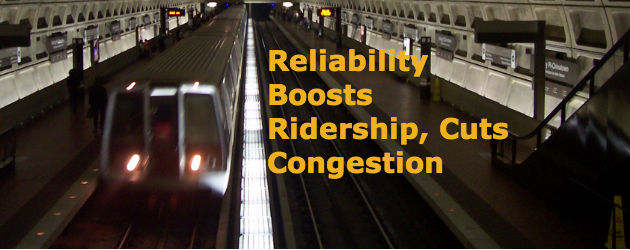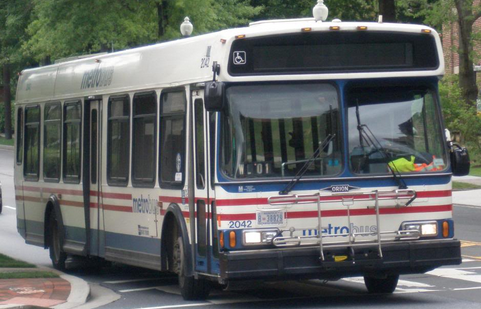Transit Reliability Could Boost Ridership, Reduce Congestion and Pollution Study Finds
 A new study to determine whether transit reliability could help reduce congestion and pollution in urban districts by stimulating more ridership has concluded with a resounding “yes!”
A new study to determine whether transit reliability could help reduce congestion and pollution in urban districts by stimulating more ridership has concluded with a resounding “yes!”
According to a new peer-reviewed research report, Reliability of Bus Transit Schedules in Washington DC , the results suggest that that greater reliability of transit schedules could motivate more people to leave their vehicles at home and ride the bus.
The report specifically looked at the Washington Metropolitan Transit Authority (WMATA) and was authored by Stephen Arhin, PhD, Errol D. Noel, PhD, and Janet Thomas, all of Howard University — working under the sponsorship of the Mineta National Transit Research Consortium.
The intent was that these research results from the Washington DC area could be applied to many other transit districts.
“Before they decide to ride transit, people place great importance on its reliability, especially in urban areas,” said Dr. Arhin. “Will the bus or train arrive on time? Can passengers make their connections? Will they be standing in the rain waiting for a late bus? This is why most transit agencies set certain performance criteria, including on-time arrival and departure. Our research goal was to determine whether the Washington Metropolitan Transit Authority (WMATA) achieved its own performance criterion for timeliness and to recommend improvements.”
 The generally accepted standard for “on time” is one minute early and five minutes late. The WMATA criterion was broader – two minutes early and seven minutes late. After analyzing 15 WMATA lines for one year (summer 2012-summer 2013), the researchers found that the bus system met its own performance goal 75 percent of the time, on average. However, it met the industry standard criterion only 61 percent of the time, on average. The report includes individual performance results for each of the 15 studied lines.
The generally accepted standard for “on time” is one minute early and five minutes late. The WMATA criterion was broader – two minutes early and seven minutes late. After analyzing 15 WMATA lines for one year (summer 2012-summer 2013), the researchers found that the bus system met its own performance goal 75 percent of the time, on average. However, it met the industry standard criterion only 61 percent of the time, on average. The report includes individual performance results for each of the 15 studied lines.
Performance recommendations
The research team recommended that WMATA adapt the industry standard criterion for on-time performance. A second recommendation stipulated that scheduled arrival studies should be conducted periodically on several representative WMATA bus lines and routes so adjustments could be made and progress could be monitored.
A third recommendation suggested that WMATA conduct a travel and run-time study using automated data collection to gauge the efficiency of bus travel on heavily traveled and patronized routes.
The team also recommended that data should be routinely compiled and analyzed for WMATA’s performance or reliability indicators on 3-5 year cycles because characteristics of routes (e.g., land-use patterns) could change over time.
In addition to the on-time arrival metric at bus stops, industry literature recommended that travel time, dwell time at stops, run time, and transit level of service should also be considered in evaluating schedule performance. One reliability survey (Cleveland) noted that its transit riders generally have a favorable opinion of transit reliability, whereas non-riders of non-frequent riders generally do not.
The 52-page report includes 19 figures and 12 tables. It can be downloaded at no cost from http://transweb.sjsu.edu/project/1139.html.
ABOUT THE MINETA NATIONAL TRANSIT RESEARCH CONSORTIUM
The Mineta National Transit Research Consortium (MNTRC) is composed of nine university transportation centers led by the Mineta Transportation Institute at San Jose State University. The Consortium was organized in January 2012 after winning a competition sponsored by the US Department of Transportation (DOT) to create consortia tasked with “Delivering Solutions that Improve Public Transportation.” Member universities include Bowling Green State University, Grand Valley State University, Howard University, Penn State University, Rutgers University, San Jose State University, University of Detroit Mercy, University of Nevada Las Vegas, and University of Toledo. More info at: transweb.sjsu.edu/mntrc.
Category: Featured, General Update









